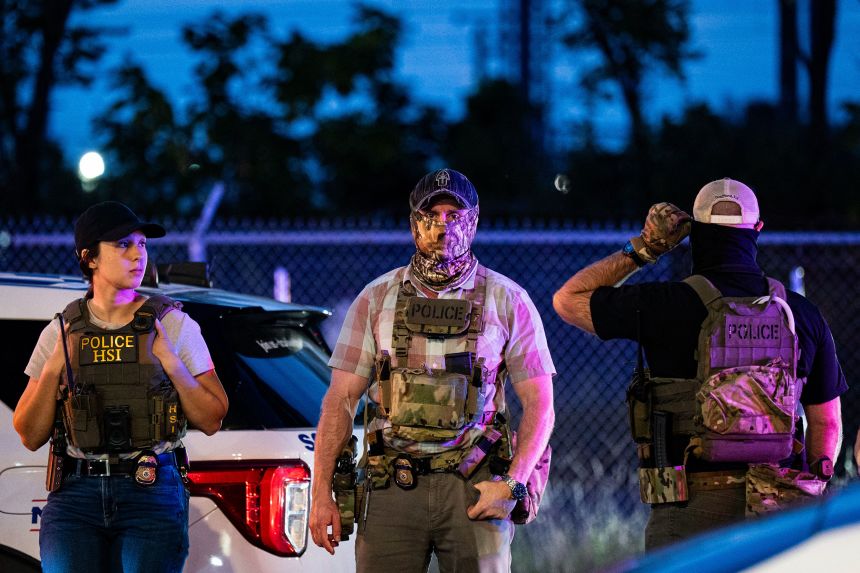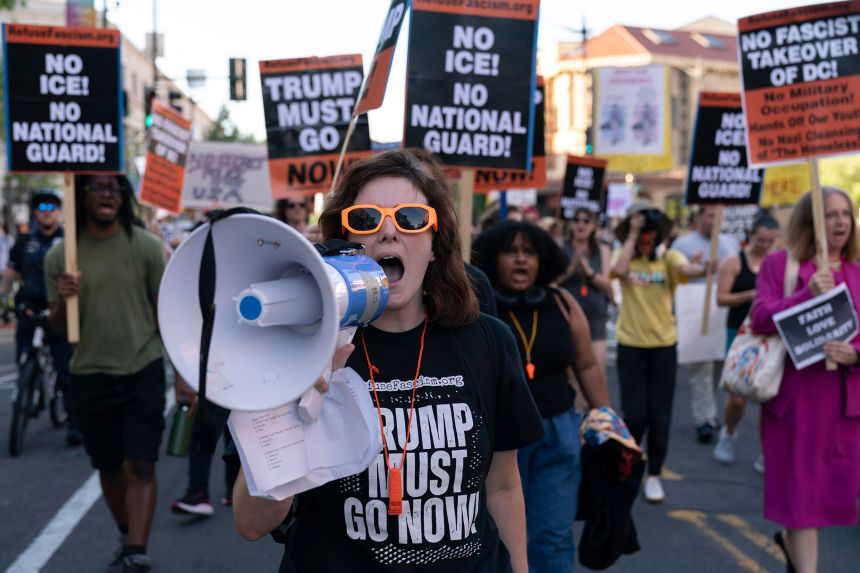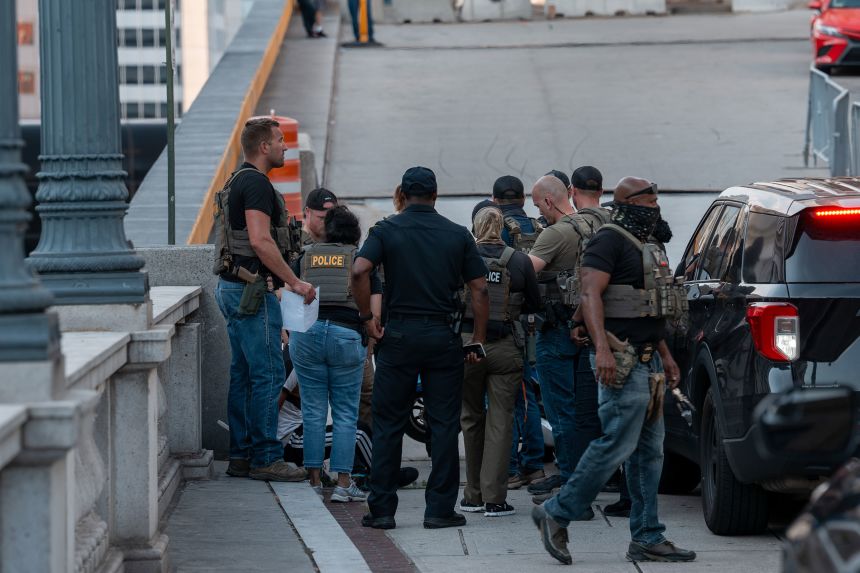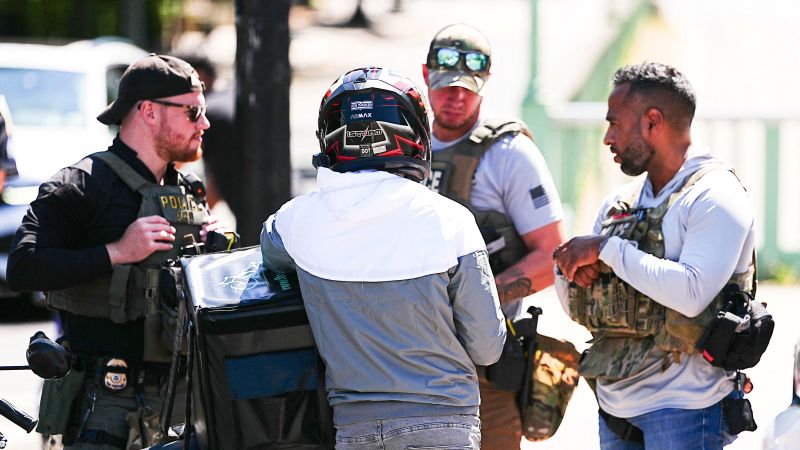Washington
—
Yakson had a delivery to pick up in Washington, DC’s Mount Pleasant neighborhood, but first he scanned the street for immigration officers. A white truck parked nearby looked suspicious. He lingered, peering through the truck window for signs of an agent. Only when it seemed clear did he dart inside the restaurant, rushing the pickup.
“People are scared,” he told CNN, his eyes still on the truck.
The Trump administration’s move to surge federal law enforcement into Washington, DC, has reshaped the daily rhythms of immigrant life in the nation’s capital. With ICE now riding alongside local police, many food delivery drivers – a workforce that includes many Venezuelan migrants – say they no longer feel safe waiting on street corners for orders.
Some have switched from mopeds to bikes to avoid attention or potential stops for traffic violations, while others have left the city altogether, leaving local businesses struggling with delayed orders, vanishing customers, and steep drops in sales. Dozens of delivery drivers in DC used to gather outside businesses while waiting for their phones to “ping” to signal the next pickup. Street corners that once pulsed with salsa, reggaetón and lively chatter have fallen silent since the start of Trump’s law enforcement push in the capital.
CNN has reported that in the first two weeks of Trump’s crackdown last month, there was a more than tenfold increase over the typical ICE arrest numbers for the district. Many residents in migrant-heavy neighborhoods now worry about being picked up by ICE, with delivery drivers especially fearful.
José, a delivery driver from Venezuela, told CNN that he changed from a moped to a bike to lessen the chances of being targeted.
“I have my wife and two children back in Venezuela (that I send money to) and bills (here) still need to be paid,” said José, who declined to share his last name.
José left Venezuela two years ago in search of a better future amid the country’s ongoing political and economic crisis, which has deepened under the country’s increasingly authoritarian government.
He told CNN being a delivery driver was his way to make ends meet. He said that after the law enforcement push in DC, his income has gone down.
“It’s hard, it’s very hard,” said José when discussing the current work environment.

During the Biden administration, thousands of Venezuelans were granted Temporary Protected Status (TPS), giving them work authorization and protection from deportation. The Trump administration has moved to end TPS.
Another driver, who’s been in Washington, DC, for three years, told CNN he has witnessed arrests that he considered unfair. “Not everyone does bad things – people deserve respect as human beings,” he said.
He added that many drivers have stopped showing up given the current climate.
“I’ve seen fewer delivery drivers on the streets because people are afraid of being deported. If someone does wrong, fine, apply the law. But those who work hard every day deserve the chance to keep working,” he said.
A different delivery driver, who asked to remain anonymous, had a simple plea: “Just let us work.”
“There is a lot of fear,” she continued. Two years ago, she fled Venezuela with her young daughter and sister amid the country’s political and social turmoil. “It’s a disaster,” she said of her homeland.

She began working as a delivery driver six months ago, drawn by the flexible hours that allowed her to earn an income while caring for her daughter.
Her sister, also a delivery driver, shares the same fear. If anything were to happen to either of them, she worries her daughter would be left alone, with no other family in the United States to turn to.
“I’m sad, scared, depressed — I don’t go into DC anymore. None of the women (who are) delivery drivers do; we all have young children,” she said. “My sales have dropped, and I’m still supporting my parents and grandmother back in Venezuela. My grandmother is very sick, and I help take care of all of them.”
Growing fears and declining sales
Some of the moped delivery drivers are Venezuela migrants who arrived in DC in 2022, bused in from Texas. They sought work and found that food delivery for the apps was not only an in-demand, steady job, but easy to get approved.
Delivery apps like Uber Eats, DoorDash, and Grubhub have varying requirements for their couriers. Some demand Social Security numbers and driver’s licenses, while others only ask for a government-issued ID – a gap that’s made certain platforms more accessible to immigrant workers.
Video captured by a Washington Post reporter of one recent arrest of a moped driver went viral on social media. White House press secretary Karoline Leavitt said the moped driver had come to the US illegally from Venezuela and had an order of removal from an immigration judge.
Leavitt has defended the federalization of DC, saying the administration is committed on making the nation’s city “safe and beautiful again.”
But immigration advocates say the change has fueled a climate of anxiety among food delivery workers. “A big fear is just being stopped and assumed to be undocumented – whether they are or not – and then getting arrested,” said Catherine Rubio of the Central American Resource Center. “There’s this fear that because they’re moped drivers, they’ll be targeted.”
Feeling unsafe in the city, some delivery workers have shifted to Maryland or Virginia, while others abandoned delivery work entirely and are now struggling to pay rent and bills, according to Amy Fisher, an organizer with Migrant Solidarity Mutual Aid.

Some businesses have also taken a hit.
Dinesh Tandon, who owns the Indian restaurant Indigo with his wife, said delivery sales have dropped about 30% in recent weeks. “Earlier, orders were picked up instantly, without delays. Now we wait for drivers – sometimes they don’t even show up,” he told CNN. In Mount Pleasant, another restaurant owner reported profits plunging by 60% because of the shortage of delivery drivers.
In nearby Columbia Heights, Latino-owned businesses describe kitchens being short-staffed after workers were arrested, while longtime customers now avoid the neighborhood’s commercial corridors. One supermarket employee said his hours were cut to just two or three days a week, and that several coworkers had already been arrested.
Hector, a business owner in Mount Pleasant who declined to give his last name but goes by “El Dominicano,” said, “My sales have gone down, as you can see,” gesturing to his nearly empty coffee shop.
“We had just opened, but since ICE started showing up in the neighborhood, people are scared – not just Latinos, but Americans as well,” he said.
When asked if he personally feels the impact, one Venezuelan driver turned to his faith. “I believe God is stronger than everything. He gives and takes away power. If something bad happens to me, it’s because He allowed it. I’m not afraid of what may come – I just put my hope in Him.”
